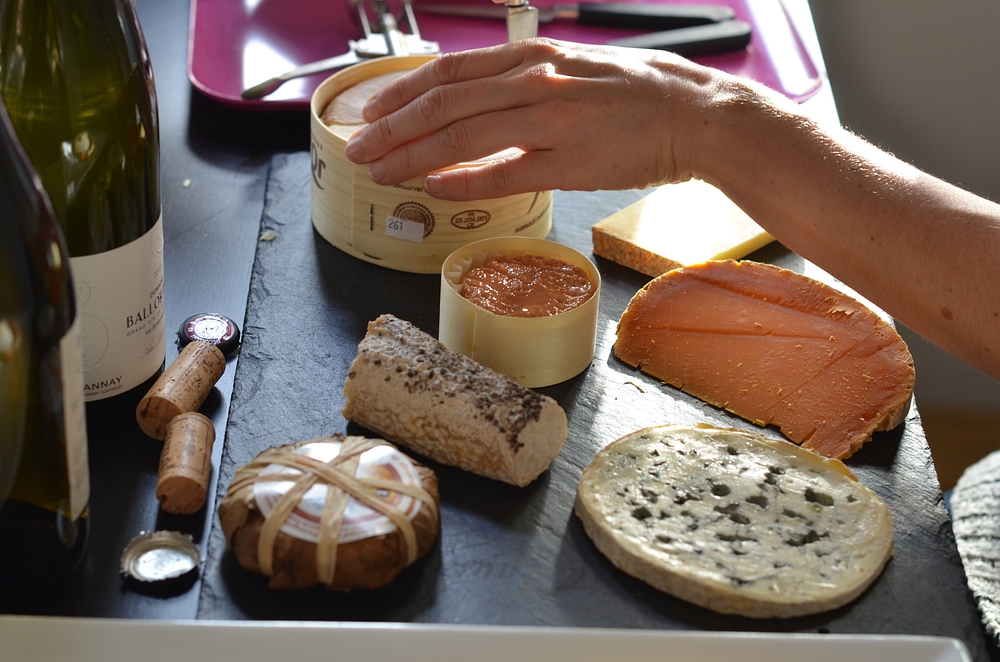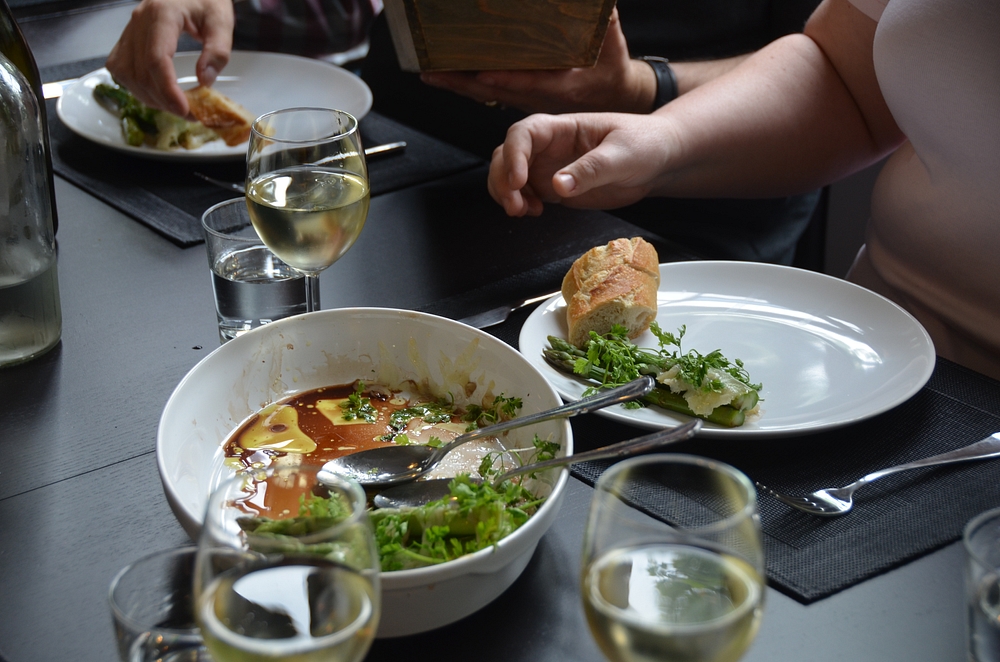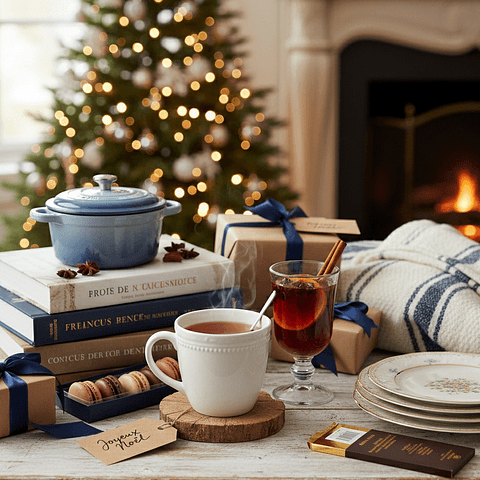
So here we go with Table Etiquette: A few things you may have noticed, and a few you may have not...
To Fork Switch or not : In France, NON.
The way to hold Couverts / Argenterie (cutlery / Silverware) in France may be different to Chez Vous. In some countries, the Fork is the main character in the dining experience - often switched back to the dominate hand once you have cut what ever you are about to eat - while the knife lays patiently on the side. You will most commonly see French using both utensils at the same time - the Knife being the main tool in their dominant hand and the Fork in the other. The knife kind of does most of the working pushing food on to the fork, from there, the only job the fork has is to deliver the mosel to your mouth.
If you set a table for a French visitor, please, please, please make sure you have placed all of the cutlery out (maybe we will get in to more of that next time?!) as the Knife and the Fork are equal players and spend more time in the hand, than on the table.
Side note: If you want to witness a miracle of physics come origami, watch a French person eat a salad. They will NEVER cut the leaves...they will meticulously use their knife and fork to push, fold and crimp the salad leaf until they end up with a delicate little parcel at the end of their fork. AND they will do so for no matter how much time it may take. We've heard that this dates back to when proper silver cutlery was used, the acid of the vinaigrette could harm the silver, so all attempts were made to keep from contact - hence no 'slicing' through the lettuce leaves.

Hands and Elbows :
A subtle but very important nuance. As you, we do not put elbows on the table. However, most importantly our hands should not go below/under the table. It may be common in your part of the world to rest your hands in your lap from time to time, but here, its 'strictement interdit' (strictly forbidden). If you look around, you'll see most people resting their arms on that meaty part between the wrist and the elbow (probably for so long they have permanent indentions, but those are the rules).
Some say this goes way back to times when you would be worried that the person at your table could harm you, so it was important to see their hands at all times. We'd like to think there was a concern over something a bit more risqué transpiring between dinner guests...who knows, maybe it's both!
A Tip about Pits :
Laughing aside, pits are a thing. Here in France, more often than not, you will find Olives, Grapes, Cherries, etc. served with pits. Even in cooked items. How you deal with those pits is a passage of French Etiquette...really.
It all comes down to discretion - which is sacred to the French. We don't talk about money (it's vulgar), we don't talk about your personal life (it's invasive), and we don't want to see the wet carcass of your Olive pit as you try to remove it from your mouth....and certainly not at a point where practically look like you are attempting to floss with it - mon dieu!
There is an art to pit removal...something you are never taught, you just learn. Take the hand that you are planning to dispose of your pit in and make a fist (slightly open - the same gesture as if you are preparing to cover a cough*). As you place your fist to your mouth, release the pit in to the small hole your fist makes. Now that the pit is hidden in your fisted hand, discretely place it in the pit receptacle. Voilà.
The devil is always in the details - and yes, pit removal is probably more if you are in 'fine company'. Note, if you are serving items with pits, please have a pit receptacle!
Toasting - the importance of the clink :
Like everything here, there is a bit of a ceremony, even if you don't notice at first glance. When you are drinking wine with others, on the first occasion that the wine is poured out to everyone, we all know to expect that a toast will ensue...but there are rules to obey (yes, rules again, but you did ask for it). Firstly, never take a sip of your poured wine until the entire 'ceremony' is finished. So what does that mean?
A toast 'ceremony' goes as follows : the wine is poured into each glass, each person 'clinks' the glass of each other individual (and yes there must be a 'clink' sound*). When you are 'clinking', you MUST look in to the the eyes of the person you are 'clinking' with (if not, it's bad luck), and as you go around to 'clink' with each person, never, never cross over the arms of someone else....because well that's bad luck too. No we are not going to test the 'bad luck' theory, certainly not in 2020!
*Some say this need to 'clink' dates back again to dining with a potential enemy. If they don't have a knife under the table ready to cut you, they might well have tried to poison you! In those times, it would be expected that you would 'clink' so hard that your wines would overflow into each other's goblets...to ensure the wine was not tampered with!
A Tip about Tips :
Oh it's the subject we all love to hate! And for our North American friends we love dearly, it's particularly fun to watch them unravel as the bill arrives (once they have figured out how to get it of course !). Coming from a land of 20% upwards of tipping, panic starts to set in.
How to tip? The first thing you need to understand is the definition of 'Tip' in France. A 'Tip' in France s called a 'Pourboire'. Literal translation being : For Drink. So the 'Tip' is meant to be a little gesture towards your waiter/waitress for them to treat themselves 'to a drink' post-service. Yes, 'service' is technically 'included' in the bill, but the Tip is meant to be a special little notion to the person who has taken care of you.
Having said that, how does it work in practice?
Usually a tip at a Bistrot or Restaurant (non-fine dining) is 1 or 2 Euros. Keep in mind, we would apply this for a small table of two diners. As the table grows, so should the tip.
At a restaurant of 'greater standing', depending on the service, you may extend yourselves and leave 5 to 10 Euros. Even at the finest of restaurants, we wouldn't leave more than that - yet, its meant to be loose correlation to the service and experience you have enjoyed.
à votre santé!
Enjoying a new culture is all about knowing how to navigate not only the city, but the people in it - so we continue on with our quick tips to help you avoid cultural gaffs, and make sure your Paris visit is a success!

